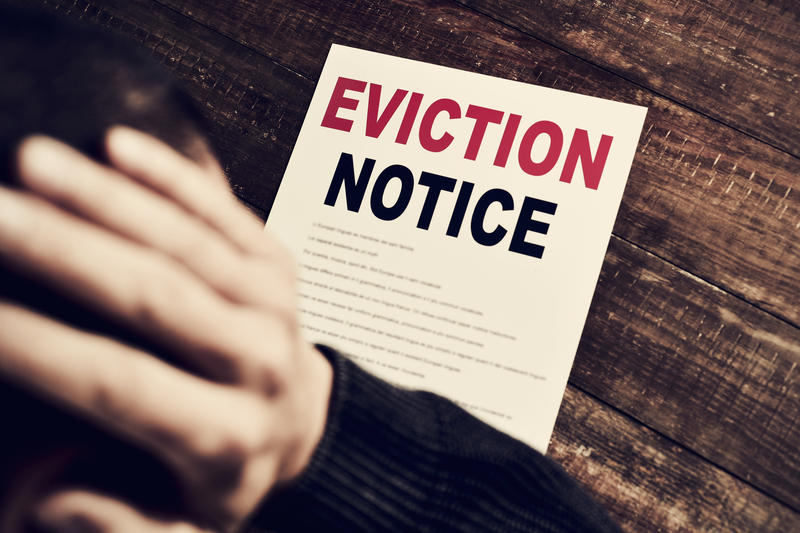Guide to the Eviction Process in North Carolina on NationalEvictions.com
The eviction process in North Carolina is a relatively straightforward process. Both landlords and tenants are expected to conform to the Chapter 42 of North Carolina General Statutes.
 The statutes lay out the procedures landlords must follow when it comes to evicting a tenant. If you fail to adhere to these laws correctly, you might set yourself up for trouble.
The statutes lay out the procedures landlords must follow when it comes to evicting a tenant. If you fail to adhere to these laws correctly, you might set yourself up for trouble.
Renters in North Carolina can be evicted for a number of reasons. The most common ones include:
- Failure to pay rent
- Breaching terms of the lease agreement
- Refusing to leave the property after the expiry of their lease agreement
- Engaging in a criminal act such as drug trafficking
If the tenant has committed any of these lease violations, you may legally remove them from the leased premises.
Eviction Notices in North Carolina
Serving an eviction notice to the tenant is the first step in evicting them. The type of notice to serve the tenant must be relevant to the violation committed. For non-payment of rent, you must give the renter a “10-day Demand for Rent.”
Simply put, this notice allows the tenant a maximum period of ten days to either pay rent due or vacate the NC premises. If the tenant fails to pay rent within this time frame, you can go ahead and file an eviction lawsuit against them.
You can also evict a “holdover” tenant. This is a tenant who stays beyond their term without renewing their lease agreement. The type of notice to serve a holdover tenant is dependent on the term of the lease. If the lease was:
- Weekly – serve a 2-day notice
- Monthly – serve a 7-day notice
- Yearly – serve a 1-month notice
These notices are also referred to as “unconditional notices to quit.” This means that the tenant has no other option but to leave. In other words, there is no option to “cure” the violation. If the renter doesn’t move out within the time specified, you can go ahead with the eviction process. You don’t need to serve them with another notice.
It’s important to note that after the lease term expires and prior to filing a complaint, you must not accept any payment. If you do, the previous term of the tenancy will renew automatically.
Aside from non-payment of rent and a holdover tenant, you can also evict a tenant in NC who violates other lease terms. For example, a tenant who:
- Brings in an unauthorized tenant
- Keeps a pet when the lease is against it
- Repeatedly disturbs neighbors, or
- Damages the rental property
Additionally, according to N.C. Gen. Stat. § 42-11, a tenant can be charged with a misdemeanor for intentional or willful damage to the rental unit.
In North Carolina, you aren’t required to give the tenant a chance to remedy the lease violation. You can file an eviction lawsuit against the tenant immediately after knowledge of the violation.
Lastly, landlords can also evict a renter engaging in criminal activities like drug trafficking. Here, North Carolina eviction laws allow for an expedited eviction. Also called “Article 7 eviction,” you may file an expedited eviction against a tenant, a tenant’s household, or a tenant guest or guests engaging in drug trafficking and other criminal activities within the rental property.
Summary Ejectment
After serving the tenant a proper eviction notice and the tenant has refused to move out of the rental property, the next step in North Carolina is to file a Summary Ejectment. Even with solid grounds to evict a tenant, it’s illegal for you to use “self-help” eviction methods.
A self-help eviction is when you retake possession of the property without using the right eviction procedures. Here are a few examples of things that you should never do as a landlord:
- Intimidate or harass your tenant
- Turn off their utilities
- Remove the tenant’s belongings prior to an official eviction
- Lock the tenant out of the property
You need to file the Summary Ejectment in the appropriate court. Typically, in North Carolina, it can either be a district court or a small claims court. For a quick settlement of your case, it’s recommended that you choose the latter. That being said, damages sought in a small claims court shouldn’t exceed $10,000. If they do, you should file the Summary Ejectment at the district court instead.
A Summary Ejectment is filed against a renter who has failed to do one of these two things: failed to comply with the requirements of the lease agreement, or has failed to surrender possession of the leased premises after their lease term has expired.
When completing the form, you are required to state the reason for the eviction in NC as well as the remedies you are seeking. Generally, an eviction lawsuit seeks two remedies:
- Getting back possession of the rental property, or;
- Getting delinquent rent from the tenant
Summons
Once you’ve filed the case and paid the filing fee, the court will issue you a Summons. This will then be served to the tenant by the county sheriff or an official of the court.
A Summons legally informs the renter that action has started. The document tells the tenant when and where the eviction case will be heard.
The North Carolina eviction laws clarify that the sheriff may serve the Summons either in person or by mail within five days of its issuance. The court hearing occurs exactly 14 days after the summons is issued.
The tenant has two options after receiving the Summons. One option is to choose to contest the removal by providing relevant defenses. The other option is simply to vacate the premises.
The Court Hearing
You must be present at the hearing in order to win the eviction. The tenant must show up in order to contest the eviction. You should bring as much evidence as possible to strengthen your case. For example, you should remember to bring:
- A copy of the NC lease agreement
- Demand notice you sent your tenant for the rent owed
- Proof of nonpayment of rent
The renter’s presence isn’t necessary at the eviction hearing if:
- The renter is willing to vacate the premises and doesn’t want to oppose the eviction
- You are merely seeking possession of the leased premises
At the hearing, the judge will give you an opportunity to present your case first. After you are done presenting your case, your tenant will similarly be offered a chance to state their case. To help win the case, the tenant may bring the following to court:
- Written communications, if any
- A witness to verify what the tenant is claiming
- Receipts for rent to prove payments have been made, and/or
- Photos of the premises (to show poor conditions).
Other common tenant defenses in NC include:
- You used “self-help” eviction methods.
- The rental property doesn’t adhere to North Carolina housing codes.
- If, for criminal activity, the tenant had no knowledge of the activity or made reasonable attempts to prevent it.
- You discriminated against the renter. That is, you based the eviction on the renter’s national origin, familial status, disability, age, race, sex, or religion.
- The notice was improperly served.
- The eviction is a retaliatory act.
- The breach of the lease violation isn’t substantial enough to warrant an eviction.
- Your allegations are false.
Judgment for Possession
If the judgment is in your favor, the judge will award you a “Judgement of Possession.” The “Judgement of Possession” gives possession of the property back to you. The tenant will then have ten days to file an appeal. If the tenant chooses to file an appeal, the court may order them to make payments of the bond to the court.
For whatever reason, is the renter is unable to make the payments on the bond, you can have the appeal quashed. If the renter still loses the appeal, the only remaining option would be to leave the premises immediately.
At this point, you can file a Writ of Possession. A Writ of Possession in NC gives the county sheriff the authority to remove the tenant out of your rental property. After the Writ of Possession is issued by the court, the sheriff would be required to carry out the eviction seven days after it’s issued.
The tenant will have ten days to remove all personal property from the rental unit.
Changing of Locks
It’s important to change the locks after the sheriff removes the renter from your property. The changing of locks must be done by a locksmith. The sheriff must also be present. The fees charged by the locksmith are your responsibility.
Handling personal property
You may find that the tenant has left behind some of their personal property in the rental unit. According to the North Carolina landlord-tenant law, landlords must notify them of their belongings before disposing of them. If the tenant doesn’t respond, you can dispose of the personal items after the time-frame on the notice expires. ( NCGS § 42-25.9 ) and NCGS § 42-36.2)
Don’t hesitate to reach out to NationalEvictions.com for your property Eviction needs in North Carolina. You can also find other States Eviction Process on our Website.
Tags:
Eviction Information,
Landlord Information,
Legal Articles,
North Carolina Eviction Articles,
Tenant Information
 Pursuant to North Carolina law with the eviction process, a landlord may, following successful judicial proceeding, forcibly evict a tenant seven days after the filing of a writ of possession. North Carolina provides four instances in which a landlord may institute eviction proceedings against a tenant: non-payment of rent, a holdover tenant situation, material breach of the lease agreement by the tenant, or drug trafficking and other criminal activity by the tenant. If one of these specified grounds exist, the landlord must then service the tenant with a notice of the eviction. The notice may give the tenant a time period to cure the violation depending on the ground for eviction. For example, in a non-payment of rent circumstance, the landlord must serve the tenant with a notice of eviction and the tenant has ten days to pay the rent. If the tenant does not comply within ten days, then the landlord may institute eviction proceedings. Landlords: Need help with an Eviction? Need us to help you File
Pursuant to North Carolina law with the eviction process, a landlord may, following successful judicial proceeding, forcibly evict a tenant seven days after the filing of a writ of possession. North Carolina provides four instances in which a landlord may institute eviction proceedings against a tenant: non-payment of rent, a holdover tenant situation, material breach of the lease agreement by the tenant, or drug trafficking and other criminal activity by the tenant. If one of these specified grounds exist, the landlord must then service the tenant with a notice of the eviction. The notice may give the tenant a time period to cure the violation depending on the ground for eviction. For example, in a non-payment of rent circumstance, the landlord must serve the tenant with a notice of eviction and the tenant has ten days to pay the rent. If the tenant does not comply within ten days, then the landlord may institute eviction proceedings. Landlords: Need help with an Eviction? Need us to help you File


















